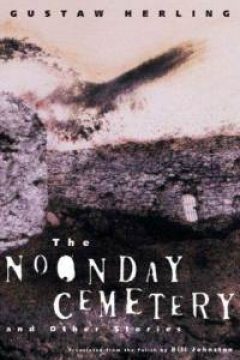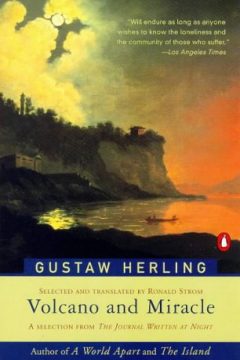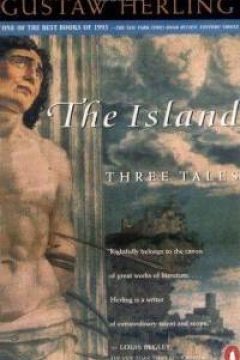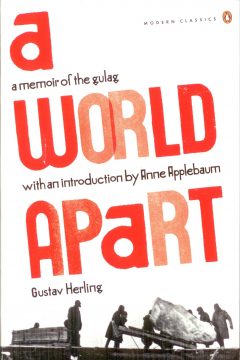Gustaw Herling (Estate)
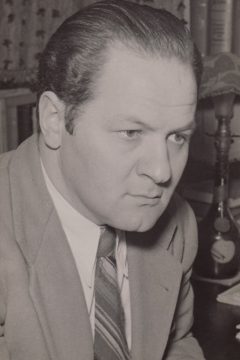
Gustaw Herling-Grudziński was born in Kielce, Poland in 1919. After the outbreak of World War II and the invasion of Poland, Herling, an active member of the resistance, escaped from the Nazi occupied territories intending to reach Romania, but was arrested in 1940 and deported to the Soviet gulag in Yercevo. When, following Hitler’s invasion of the Soviet Union, Stalin’s temporary amnesty for political prisoners in 1941 failed to secure his release, Herling went on hunger strike, almost paying with his life. On finally gaining his freedom in January 1942, Herling joined General Władysław Anders and hundreds of thousands of other released deportees and prisoners in Kazakhstan in the newly created division of the Polish Army, the II Corps, with whom he later fought alongside the Allies in central Italy at Monte Cassino and Ancona.
His first prose, articles and reviews appeared from 1943 in the Polish Army in the Middle East’s periodicals: Kurier Polski (‘Polish Courier’, Baghdad), W drodze (‘On the Road’, Jerusalem) and Dziennik żołnierza APW (‘Soldier’s Daily’, Rome). After the war he remained for a time in Rome where he took the post of literary editor of the periodical Orzeł Bialy (‘White Eagle’). At the end of 1946 with Jerzy Giedrojć and Józef Czapski he co-founded the Instytut Literacki (Literary Institute) and the political and cultural periodical, Kultura (‘Culture’), which virtually sustained Polish culture through the decades when Communists ruled Poland and free expression was censored. At the same time he contributed articles, essays and short stories for Wiadomości ([Literary] ‘News’), which was published in London. He moved there in 1948 and then to Munich, where he worked for the Polish Service of Radio Free Europe.
Herling’s memoir of his experiences in the Soviet gulags, A World Apart, which was one of the first and most enduring accounts of life and death in the Soviet network of prisons and labour camps, appeared in 1951 in English translation, with a foreword by Bertrand Russell, whilst the original Polish edition was published by Gryf, in London in 1953. This was followed by editions in the US, Sweden, Germany, Italy, Argentina, Japan, Hong Kong and also an Arabic edition. In Poland it was initially published in the underground press in 1953, with the first official edition appearing in 1989.
In 1955 Gustaw Herling married the daughter of Benedetto Croce, the Italian philosopher and literary critic, and settled in Naples. This saw the start of long term collaboration with the Italian periodicals Il Mondo and Tempo presente (1956-1968) and frequent contributions to Il Corriere della Sera, Elsinore, L’espresso, La Fiera Letteraria, Il Giornale, La Stampa, and Il Mattino. He continued to write for the London Wiadomości until 1969 and Na atenie (‘On the Air’, Munich) until 1967. In 1966 he resumed his collaboration with Kultura in Paris, providing prose, sketches, articles, literary reviews and translations. In 1971 Herling commenced writing his Dziennik pisany nocą (‘Journal Written at Night’), a work spanning three decades and covering fiction, essays, anecdote, memoir and criticism.
Gustaw Herling was awarded many literary prizes, including the Italian Premio Viareggio and Premio Vittorini, the international Prix Gutenberg and the French Pen-Club Award (1986). Polish awards include Kultura in Paris (1958), the Jurzykowski Foundation Prize in New York (1964), the Kościelski Prize (1966) and the Wiadomości award of the London-based journal (1981).
He died on 4 July 2000, in Naples. The drafts of two novellas, one unfinished, were found in his study and published posthumously in Poland in 2006 and 2007 by Wydawnictwo Literackie, who are to publish the author’s entire oeuvre.
Gustaw Herling Bibliography
Żywi i umarli (The Living and the Dead), Oddział Kultury i Prasy 2 Korpusu Rome 1945; FIS Lublin 1991
Inny Świat (A World Apart), Gryf London 1953
Skrzydła ołtarza (The Island and The Tower), Instytut Literacki Paris 1960
Drugie przyjście (The Second Coming), Instytut Literacki Paris 1963
Inny Świat (A World Apart, subsequent editions – at least 5 in Paris and 8 by the Polish underground press in the 1980’s alone), Instytut Literacki Paris 1965; Czytelnik Warsaw 1989
Upiory rewolucji (Phantoms of the Revolution), Instytut Literacki Paris 1969; UMCS Lublin 1999
Dziennik pisany nocą 1971-72 (Journal Written at Night), Instytut Literacki Paris 1973; Czytelnik Warsaw 1995
Dziennik pisany nocą 1973-79 (Journal Written at Night), Instytut Literacki Paris 1980; Czytelnik Warsaw 1995
Dziennik pisany nocą 1980-83 (Journal Written at Night), Instytut Literacki Paris 1984; Czytelnik Warsaw 1996
Dziennik pisany nocą 1984-88 (Journal Written at Night), Instytut Literacki Paris 1989; Czytelnik Warsaw 1996
Dziennik pisany nocą 1989-92 (Journal Written at Night), Czytelnik Warsaw 1997
Dziennik pisany nocą 1993-96 (Journal Written at Night), Czytelnik Warsaw1998
Dziennik pisany nocą 1997-99 (Journal Written at Night), Czytelnik Warsaw 2000
Wieża i inne opowiadania (The Tower and Other Stories), W Drodze Poznań 1988; 1990
Opowiadania zebrane (Collected Stories), W Drodze Poznań 1990
Godzina cieni (The Hour of Shadows), Znak Kraków 1991; Czytelnik Warsaw 1997
Sześć medalionów i srebrna szkatułka (Six Medallions and the Silver Coffer), Czytelnik Warsaw 1994
Portret wenecki (The Venetian Portrait), UMCS Lublin 1995
Błogosławiona święta (The Blessed Holy One or Beata Santa), UMCS Lublin1996
Don Ildebrando, Presspublica Warsaw 1997
Gorący oddech pustyni (The Hot Breath of the Desert), Czytelnik Warsaw 1997
Rozmowy w Dragonei (Conversations in Dragonea), Szpak Warsaw 1997
Wyjście z milczenia (Breaking the Silence), Czytelnik Warsaw 1998
Podzwonne dla dzwonnika (The Bell-Ringer’s Toll), Czytelnik Warsaw 1999
Biała noc miłości (White Night of Love), Czytelnik Warsaw 1999
Opowiadania zebrane I (Collected Stories, vol I), Czytelnik Warsaw 1999
Opowiadania zebrane II (Collected Stories, vol II), Czytelnik Warsaw 1999
Najkrótszy przewodnik po sobie samym (The Shortest Guide to Oneself), Wydawnictwo Literackie Kraków 2000
Biała noc miłości: Opowiadania (White Night of Love: Short Stories), Czytelnik Warsaw 2002
Wędrowiec cmentarny (The Graveyard Drifter), Wydawnictwo Literackie Kraków 2006
Wiek biblijny i śmierć (Biblical Age and Death), Wydawnictwo Literackie Kraków 2007
Dzieła Zebrane tom 1, Recenzje, szkice, rozprawy literackie 1935-1946 (Collected Works, volume I, Reviews, Sketches, Literary Discourse 1935 – 1946), Wydawnictwo Literackie Kraków 2009
Dzieła Zebrane tom 2, Recenzje, szkice, rozprawy literackie 1947-1956 (Collected Works, volume I, Reviews, Sketches, Literary Discourse 1947-1956), Wydawnictwo Literackie Kraków 2010
Inny Świat (A World Apart), Wydawnictwo Literackie Kraków 2010
Dziennik pisany nocą 1971-81 (Journal Written at Night), Wydawnictwo Literackie Kraków 2011
Dziennik pisany nocą 1982-1992 (Journal Written at Night 1982-1992), Wydawnictwo Literackie Kraków 2012
Dziennik pisany nocą 1993-2000 (Journal Written at Night 1993-2000), Wydawnictwo Literackie Kraków 2012
Selected translations
German:
Welt ohne Erbarmen (A World Apart), Politik und Wirtschaft 1953
Der Turm und Die Insel (The Tower and The Island: Two Stories), Kiepenheuer & Witsch 1966
Die Insel (The Island), Hanser 1994
French:
Un monde à part (A World Apart), Denoël 1985; Gallimard 1995
Journal écrit la nuit (Journal Written at Night 1973-1979), Gallimard 1989
L’île et autres récits (The Island and Other Stories), Gallimard 1992
Le portrait vénitien et autres récits (The Venetian Portrait and Other Stories), Gallimard 1995

